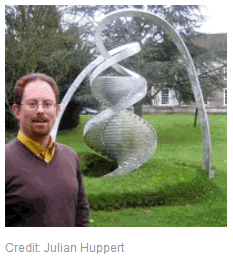|
|
|
|
|
|
|
News & Views item - May 2010 |
![]() Dr Huppert Goes to Westminster. (May 21, 2010)
Dr Huppert Goes to Westminster. (May 21, 2010)
 Dr
Julian Huppert (31) is Research Council UK Academic Fellow in Computational
Biology and a Fellow of Clare College, Cambridge. He originally majored in
organic chemistry, working on asymmetric catalysis but then went on to earn his
PhD in biochemistry in 2005. His current research is on
G-quadruplex nucleic acids.
Dr
Julian Huppert (31) is Research Council UK Academic Fellow in Computational
Biology and a Fellow of Clare College, Cambridge. He originally majored in
organic chemistry, working on asymmetric catalysis but then went on to earn his
PhD in biochemistry in 2005. His current research is on
G-quadruplex nucleic acids.
However, in the May 6 general election Dr Huppert was elected as a Liberal Democrat MP to represent Cambridge, and when ScienceInsider asked him whether he intended to multitask he replied: "Being a research scientist and a member of parliament are both full-time jobs. I will have to leave the lab. It was a tough decision. ... The general perception is that I can probably do more for the research community by being a voice who can speak up for it... There's been a lot of [advocates for science] standing down and then also people who lost their seats. My colleague Evan Harris is a real loss. [Harris was the Liberal Democrat science spokesperson.] So, yes, it's a real concern, the shortage of people who understand science, even in the broader senses."
Below we record some of the more cogent views voiced by Dr Huppert in answering a number of questions put to him by ScienceInsider's John Travis:
There are a number of [current] problems with British science. Part of it is the increasing amount of central control, increasing bureaucracy with things like impact assessments, and the lack of freedom to do creative science.
[In regard to decision making] I think there's a big difference between being informed by the scientific evidence and the final decision that's made. What I'm calling for is scientifically informed, evidence-based policy. So, it's not a simple case. You don't say if a drug kills more than this many people a year, it's unsafe. There are lots of other factors, there are lots of value judgments. What I want is politicians to be aware of evidence and know how to interpret the evidence and then make their political judgments and value decisions based on that evidence.
[And as to how the government's handled scientific advice one] of the key things is it failed to get the trust of the scientists, and I think that's a big problem. It's hard because sometimes scientific evidence is counterintuitive, and politicians have to be able to accept that. We also need to understand the difference between hearing advice, considering advice, and acting on exactly what it is. I'm very much pro- scientific evidence, but I don't want a sort of technocracy where scientists say, "This is the right way to do something."
As a final point Mr Travis asked: "In your campaign, you didn't seem to be running as a scientist; you certainly weren't hiding that aspect of your career, but it wasn't the dominant thrust. Is that a fair assessment?" To which Dr Huppert replied:
I've been 8 years as a county councillor, several years on the regional assembly, so, no, being a scientist is not the only thing about me. But it was mentioned on pretty much every single piece of literature that we put out. We had a glossy magazine that included a feature about some of my work. But I think the general public is not interested in the details of quadruplex ligands.